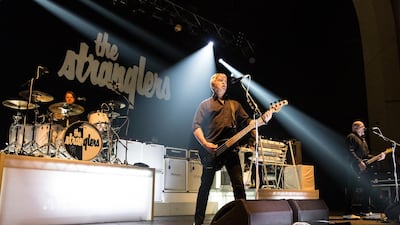There is a school of thought that suggests the contribution by The Stranglers to the UK’s explosive punk scene of the 1970s has been overlooked.
The reason for this is not so complicated says Jean-Jacques “J J” Burnel, the band’s bassist and vocalist, ahead of their visit to Dubai for a show at the Irish Village on Thursday.
Much of the "official" punk narrative has been retold by Jon Savage, the broadcaster and writer behind the influential 1991 punk history book England's Dreaming.
And back in the heady days of 1977, Burnel “beat up” the journalist – a fact which still amuses him to this day.
“I slapped him [Savage] about a bit, he wasn’t worthy of a beating,” says Burnel, a lifelong karate expert who still teaches the martial art regularly, and holds a coveted seventh-degree black belt, or dan.
“He’s written us out, which is fine, we’re still going and they’re not,” says Burnel.
The “they” he is referring to is punk’s golden duo, The Clash and the Sex Pistols, both of which The Stranglers predate by a year or so.
“They got the credit at the time, because they had much better clothes,” says Burnel.
“[The Clash frontman] Joe Strummer was coming to see us when he was still in a rhythm-and-blues band called The 101ers, Steve [Jones] and Paul [Cook] from the Sex Pistols were certainly checking us out before I’d ever heard of them, and [The Pretenders] Chrissie Hynde was with them. All the bands from that period had seen us at least once or twice.”
Burnel’s assault on Savage – over a mediocre review – has gone down as the stuff of punk legend. It was not the first punch the bassist had thrown, and he still has an intimidating reputation.
“You’ve got to have the right to reply,” he says.
In a scene defined by irreverence, nihilism, excess and its anti-establishment stance, The Stranglers’ brand of antagonism still managed to stand out as the target of critical ire. Yet commercially, they were unrivalled among punk contemporaries, notching up a dozen hit singles during an incredible run from 1977-1982.
Formed three years earlier in Guildford, mainstream success came for the band during punk's golden year, 1977, with their second single, Peaches, a not-so-subtle song crudely detailing the lascivious thoughts of a macho beach-stroller. Banned by the BBC, it still became a top-10 hit. At the time, everyone missed the irony.
“Political correctness and irony are not bedfellows,” he says.
The band scored follow-up top-10 hits with No More Heroes and Something Better Change, but by 1979 punk was dead, and their record company told them to call it a day.
“We looked at each other and thought, you’re not our managers anymore,” says Burnel.
Their response was to go weirder, writing a series of ambitious, experimental, concept albums at ever-greater odds with the punk ethos. Burnel describes 1981's The Gospel According to the Meninblack as "quite difficult to listen to if you're not on heroin" (as he confirms he was at the time).
Having alienated the mainstream, the band made an unrecognisable shift into commercial pop-rock with 1984's Aural Sculpture. Then lead singer Hugh Cornwell suddenly quit in 1990 and that was nearly the end. "I didn't see it coming," says Burnel. "I thought: 'That's it.' The others didn't agree; we'd written most of the next album already, so we ploughed on."
Cornwell’s shoes were filled during the 1990s by long-term associate John Ellis, and from 2000 by Baz Warne, as The Stranglers drifted into obscurity.
Taking time out of London to recover from a collapsed marriage, the Jacobean cottage Burnel chose as a writing retreat turned out to be just metres from the excavation of Seahenge, a prehistoric monument off the north Norfolk coast.
Spinal Tap allusions aside, Burnel said it proved to be the ideal inspiration, leading to 2004's Norfolk Coast album, a charged and inspired critical triumph that ended a six-year drought of releases.
“My marriage was falling apart, The Stranglers were going around in ever-decreasing circles, I wasn’t quite sure what was happening in my life,” he says.
“It turned out to be really quite magical. Suddenly they found a Druidic sort of circle, all made of ancient oak, which had been preserved a few hundred yards from where I was living. I just felt the stars had aligned.”
The momentum was maintained with two well-received follow-ups, 2006's Suite XIV and 2012's Giants – and Burnel says three songs are already in the bag for an 18th LP – but today The Stranglers are principally a live concern.
Drummer Jet Black is retired, leaving keyboardist Dave Greenfield the only other founding member remaining.
“I wouldn’t do anything differently,” says Burnel, then pauses. “Although, I might see things in a different light if I wasn’t in the place I am now.”
The Stranglers will perform at The Irish Village on Thursday, November 24 at 9pm. Tickets are Dh150 from dubai.platinumlist.net
rgarratt@thenational.ae

